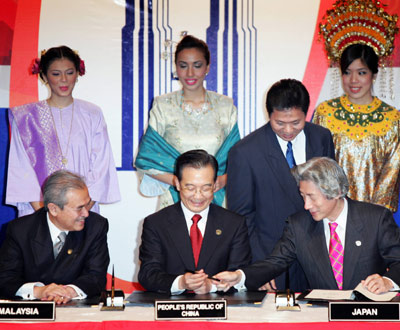|
Wen: East Asia should embrace others
(China Daily)
Updated: 2005-12-15 06:04
KUALA LUMPUR: East Asian co-operation should be an open and transparent
process rather than being "closed, exclusive or directed against any particular
party," Premier Wen Jiabao said yesterday at the first-ever East Asia Summit.
"It ... should welcome Australia, New Zealand and
India's participation and also welcome the participation of Russia. It should
strengthen contact with the United States, the European Union and other
countries," he said.

Japanese Prime
Minister Junichiro Koizumi (R) returns the pen to Chinese Premier Wen
Jiabao (C) as Malaysia Prime Minister Abdullah Ahmad Badawi looks on
during the signing of the declaration on the East Asia Summit during the
11th ASEAN Summit in Kuala Lumpur December 14, 2005.
[Reuters] |
Asian leaders hailed a new era of co-operation yesterday as the summit ended
with a call for greater efforts to promote regional peace, security and
prosperity.
The 16 leaders signed a declaration pledging annual talks on broad strategic,
political and economic issues of common interest and concerns such as security
and trade.
"It symbolizes that the co-operation of East Asia has entered a new stage,"
Wen said.
The three-hour inaugural meeting brought together the 10 countries of the
Association of Southeast Asian Nations (ASEAN), plus China, Japan, the Republic
of Korea, India, Australia and New Zealand.
The gathering represented about half of the world's population and a fifth of
global trade.
Wen reassured other leaders that China would stick to a path of peaceful
development and does not pose a threat to its neighbours.
"China will never seek domination in East Asia. China will not develop at the
expense of others, and its development will not threaten any other country," he
said.
"No matter what may happen in the international arena, China will remain a
trustworthy and reliable partner of the people in this region."
Malaysian Prime Minister Abdullah Ahmad Badawi, who chaired the talks, said
the leaders have agreed that the ASEAN, as the driving force of the event, will
play a core role at the summit.
The East Asia Summit will be an annual event, and the second will be held in
the Philippines next year, Badawi told reporters.
He also said Moscow's formal request to join the summit was accepted and
Russia would attend the next summit.
According to the Kuala Lumpur Declaration, the summit nations vowed to work
on "financial stability, energy security, economic integration and growth,
eradicating poverty and narrowing the development gap."
"This region today is a source of dynamism for the world economy," it said.
The Malaysian hosts said the talks also covered de-nuclearization on the
Korean Peninsula, international terrorism, maritime security and the threat of
infectious diseases.
With more than 60 people dead from bird flu in Asia since 2003, the fight
against a possible avian influenza pandemic has also become a priority, and the
leaders issued a separate declaration on region-wide measures that they would
take.
During a meeting with his Indian counterpart Manmohan Singh on the sidelines
of the summit yesterday, Wen said China and India are co-operation partners, not
rivals.
The common interests of the two nations are greater than their differences,
and bilateral co-operation is greater than their competition, he said.
Wen yesterday also met his Australian counterpart John Howard, Indonesian
President Susilo Bambang Yudhoyo and Myanmar Prime Minister Soe Win on enhancing
bilateral co-operation.
(China Daily 12/15/2005 page1)
|